
Contact Us
Contact Us Now

Welcome to Border Collie Rescue Scotland
Registered Charity in Scotland No SC040796



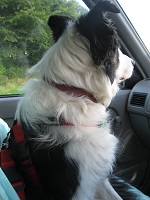


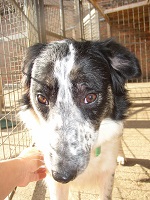

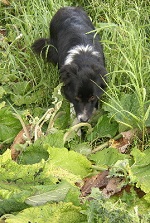



Re-homing a dog through Border Collie Rescue
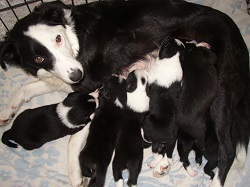
If you have a Border Collie that you wish to re-home - please read on
Border Collie Rescue no longer keeps a register of dogs waiting to be re-homed (a waiting list). We now only take in dogs on a first come first served basis
Unfortunately we are asked to take in more dogs than we realistically can.
If you have a Border Collie you wish to re-home, and we have a space available when you phone us, we will offer you that space providing you can bring the dog to us within the time agreed during the phone call.
We give priority to dogs that are genuinely homeless or facing euthanasia.
This means, in effect, that priority is given to dogs in stray kennels and pounds via a Local Authority Officer, dogs threatened with a court destruction order via a Court or Police Officer, dogs referred to us by Veterinary practitioners having been signed over for euthanasia, dogs referred to us by Social Services or other Authority on behalf of a client or dogs referred to us by a GP or NHS facility on behalf of a client.
In these instances we will need to be contacted by Local Authority, Court, Police, Veterinary practice, Social worker or NHS.
We also assist other registered rescues with Border Collies needing more specialised rehabilitation, working assessment, training or home finding and try and reach out to as many redundant farm dogs as we can.
Unfortunately there is a limit to our resources and consequently a limit as to the numbers of dogs we can take.
With more funding and the ability to run more centres we will be able to take in more dogs.
If you have a Border Collie that you wish to re-home, you will need to allow time to find a charity who can take it.
Even allowing for that, you may not find it easy.
Because they can be a problem in kennels, an increasing number of rescue groups are reluctant to take on Border Collies and some will refuse completely.
These days, many rescues will not take in dogs that have shown aggression to humans, particularly towards children.
Dogs with any form of aggression cannot be responsibly rehomed and will require long rehabilitation. There will always be a risk that such a dog could revert if handled poorly.
A responsible rescue will make a full disclosure of known problems, and this is likely to mean that such a dog will be refused by everyone it is offered to.
These days, some rescue organisations are so busy importing dogs from Ireland and abroad they do not have the space to take dogs from members of the UK public. This means less space for homeless UK dogs and there are enough here already!
(We only take in and re-home dogs within the UK. we do not import dogs from elsewhere or export them abroad)
If we are full, will we still be able to help?
If we are unable to assist you by taking in your dog we will try and give you telephone numbers of rescue centres near you.
To contact us about re-homing, do not email us - please phone 01644 440654
- office hours - 2 pm to 5 pm Mon - Thurs
If you have a Border Collie you are keeping as a pet and you are experiencing problems, you are not alone.
You may not wish to part with your dog. It may have a training or behavioural issue you wish to overcome but need help with.
If so, we run a telephone advice line and can even arrange one to one assessments at our centre for advice on training and behavioural issues.
For details of how to use these services click the link below.
Border Collie Rescue - Advice and Help
A word of warning about searching for a rescue to take in your dog.
We suggest you only approach a genuine rescue which is either a registered non-profit or a registered charity.
These can be identified by either -
a non-profit company statement and number Registered companies are required to display their numbers and status on all stationery, including websites.
There is a standard format they must comply with.
To comply we state we are a - Non-Profit distributing charitable company No 3037504. Registered in England.
The inclusion of the word 'charitable' indicates our governing document structure and objects are charitable in nature.
If we were not 'charitable' and simply set up as a company which re-invested profits, rather than distributed them, the word 'charitable' could not be used and it would be
fraudulent to include it, or -
a registered charity statement and number.
Their status can be verified, the former with Companies House, the latter with the Charity Commission (or OSCR in Scotland).
There are a lot of non-charitable rescue's around.
Be very wary if using the internet as some of them look quite plausible.
If they are not a non-profit or charity, they are a business exploiting the situation of numbers of unwanted pets for profit.
Some of them are outright scams, dog dealers seeking to get around commercial licensing laws by posing as a good cause.
Some seek to avoid paying income tax they would be liable for as a business by keeping below the horizon of HMRC.
Such scams usually describe themselves as "not for profit" and generally do not provide a contact address on their website and will hide behind a mobile phone number so they are more difficult to trace and hold accountable.
Their websites are designed to look or 'feel' similar to the websites of genuine charities and they will use similar domain names to get in the search engine lists alongside the charities they emulate.
They will also seem to get a higher than average proportion of puppies as these will be sourced commercially (puppy farms) usually from Wales or Ireland.
These commercial rescue are not regulated like registered Charities and Non-profits and are only accountable to themselves for their actions and funds.
If you give them money you are giving it to private
enterprise, not charity and it may be subject to tax.
If you sign your dog over to them you are giving it away to a private individual or business partnership, not a genuine organisation, and it belongs to them to do with as they please.
Sometimes you may be asked to make a "donation" or pay a fee when handing over your dog.
No genuine rescue or charity would make this a condition - by demand or emotional blackmail.
The worst sort of scams will demand payment for taking a dog in then dump the dog on the streets or have it destroyed using some of the money
demanded, keeping any balance as profit.
Until 'Rescue' is properly regulated in the UK such people will be able to take advantage - don't get caught and don't let your dog get caught either.
There are many reasons why a Border Collie may be turned down by a genuine rescue charity.
Many BC that have been kept as pets have developed problems and trauma's that are difficult for many rescue groups to overcome.
The time and effort they have to spend on re-habilitating one BC can be given to a dozen or more dogs of other breeds that are more suited to being household pets.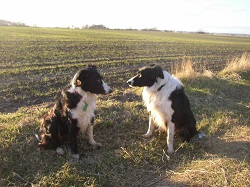
They can therefore re-home more dogs if they don't fill their kennels with Border Collies.
Many rescues set great store by quantity and cherry pick dogs to take in.
Most rescue groups are only set up to re-home dogs as pets.
They know that a high proportion of BC's they take in need more from life than a family home can offer, which is why most pet BC's are put up for re-homing. If a rescue is unable to assess a dog for its herding capabilities or re-home a dog into a working home they know that any re-homing is likely to undo work they have done rehabilitating the dog and result in more problems with the dog coming back to them again, and again.
Most rescue centres use kennels to accommodate the dogs they take in.
Many Border Collies quickly become over stimulated in a kennel environment, making it more difficult to identify any problems and apply behavioural modification programs.
In many cases a Border Collie coming into a kennel environment will develop worse problems than any it came in with.
Finally - every rescue centre we know and deal with are asked to take on far more dogs than they can sensibly deal with - they are all under huge pressure.
Those that work responsibly and do not cut corners have built up extensive waiting lists, averaging 12 weeks or more.